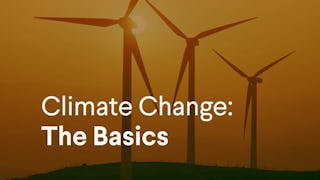This course will give you practical experience in working with real-world data, with applications to important policy issues in today’s society. Each week, you will learn specific data handling skills in Excel and use these techniques to analyse climate change data, with appropriate readings to provide background information on the data you are working with. You will also learn about the consequences of climate change and how governments can address this issue.



Doing Economics: Measuring Climate Change


Instructors: Eileen Tipoe
5,964 already enrolled
Included with 
(52 reviews)
Recommended experience
Skills you'll gain
Details to know

Add to your LinkedIn profile
5 assignments
See how employees at top companies are mastering in-demand skills

There are 4 modules in this course
This module explains why climate change is a serious global issue, and how we can use data to understand the extent of climate change.
What's included
6 readings1 assignment2 discussion prompts
This module explores the effect of climate change on temperature variability and extreme weather events, and explains how we can use statistical summary measures to document changes in temperature distributions over time.
What's included
7 readings1 assignment5 discussion prompts2 plugins
This module uses data to summarise the relationship between CO2 emissions and global temperatures, explains methods of identifying causal relationships between two variables, and discusses the problem of spurious correlation.
What's included
5 readings1 assignment3 discussion prompts1 plugin
This module explains how policymakers can use survey data and models to evaluate climate-related policies, and discusses the relationship between environmental policy and environmental quality.
What's included
7 readings2 assignments2 discussion prompts
Earn a career certificate
Add this credential to your LinkedIn profile, resume, or CV. Share it on social media and in your performance review.
Instructors

Explore more from Data Analysis
 Status: Free Trial
Status: Free Trial
Council on Foreign Relations
 Status: Free Trial
Status: Free Trial
University of Colorado Boulder
 Status: Free Trial
Status: Free Trial
Duke University
 Status: Free Trial
Status: Free Trial
University of Colorado Boulder
Why people choose Coursera for their career




Learner reviews
52 reviews
- 5 stars
73.07%
- 4 stars
21.15%
- 3 stars
1.92%
- 2 stars
0%
- 1 star
3.84%
Showing 3 of 52
Reviewed on May 25, 2022
Excellent review of measuring climate change from an economics standpoint.
Reviewed on Jul 1, 2023
Although it's mostly reading based, it is a very well structured and interesting course. The exercises are very useful and well explained.
Reviewed on Dec 1, 2022
Found the course very interesting, and provided a good introduction into the topic. The example exercises were also thought-provoking, and provided a good balance between depth and complexity.

Open new doors with Coursera Plus
Unlimited access to 10,000+ world-class courses, hands-on projects, and job-ready certificate programs - all included in your subscription
Advance your career with an online degree
Earn a degree from world-class universities - 100% online
Join over 3,400 global companies that choose Coursera for Business
Upskill your employees to excel in the digital economy
Frequently asked questions
Access to lectures and assignments depends on your type of enrollment. If you take a course in audit mode, you will be able to see most course materials for free. To access graded assignments and to earn a Certificate, you will need to purchase the Certificate experience, during or after your audit. If you don't see the audit option:
The course may not offer an audit option. You can try a Free Trial instead, or apply for Financial Aid.
The course may offer 'Full Course, No Certificate' instead. This option lets you see all course materials, submit required assessments, and get a final grade. This also means that you will not be able to purchase a Certificate experience.
When you purchase a Certificate you get access to all course materials, including graded assignments. Upon completing the course, your electronic Certificate will be added to your Accomplishments page - from there, you can print your Certificate or add it to your LinkedIn profile. If you only want to read and view the course content, you can audit the course for free.
You will be eligible for a full refund until two weeks after your payment date, or (for courses that have just launched) until two weeks after the first session of the course begins, whichever is later. You cannot receive a refund once you’ve earned a Course Certificate, even if you complete the course within the two-week refund period. See our full refund policy.
More questions
Financial aid available,





